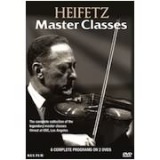In the early 1960s, Jascha Heifetz agreed to have some of his violin classes at the University of Southern California filmed for posterity, resulting in eight programs originally broadcast by National Educational Television, and presented here complete on DVD. These are not the one-shot, public master classes you often see on video; they represent regular sessions with the same students in attendance.
Today’s documentary directors probably would have edited out long stretches of tuning or shots of the participants walking back and forth. Yet such moments enhance the production’s realism. Heifetz generally sits behind a desk, listening intently with score in hand, and is prone to tap out the rhythm with a pencil when students take even the smallest rhythmic liberties.
There are exceptions, of course, such as when Heifetz tries to get Adam Han-Gorski to phrase Brahms more freely. Yet his suggestions are always pinpointed and purposeful. He proves both demanding and patient in trying to get Robert Witte to shape the Tchaikovsky concerto’s third-movement introduction in a way that best leads into the main tempo, and works with future conductor/then violinist Varoujon Kodjian to clarify balances and maintain a consistent rhythmic impetus in Wieniawski’s Polonaise Brilliante No. 2.
Violinist Erick Friedman is the most-featured student throughout these classes, and although his artistry already operates at an extraordinary level of accomplishment, Heifetz still finds a few bones to pick. He and Friedman team up for two of the Bach Double Concerto’s movements, where they display dazzling unanimity. Other unique moments to savor are the teenage Carol Sindell (who went on to a brilliant teaching career) in the first movement of Bach’s A minor concerto with Heifetz adroitly accompanying her at the piano, plus two Beethoven quartet movements performed by class members (Op. 18 No. 5’s first movement features Heifetz sitting in).
Then there’s Heifetz’s brilliant imitation of an untalented student hacking through the first movement of Vieuxtemps’ Fourth concerto. He does this with deadpan humor and impeccable timing, very much in the manner of Mozart incorporating inept compositional techniques in A Musical Joke. In short, Heifetz fans and string professionals alike will find this release valuable and essential.
































